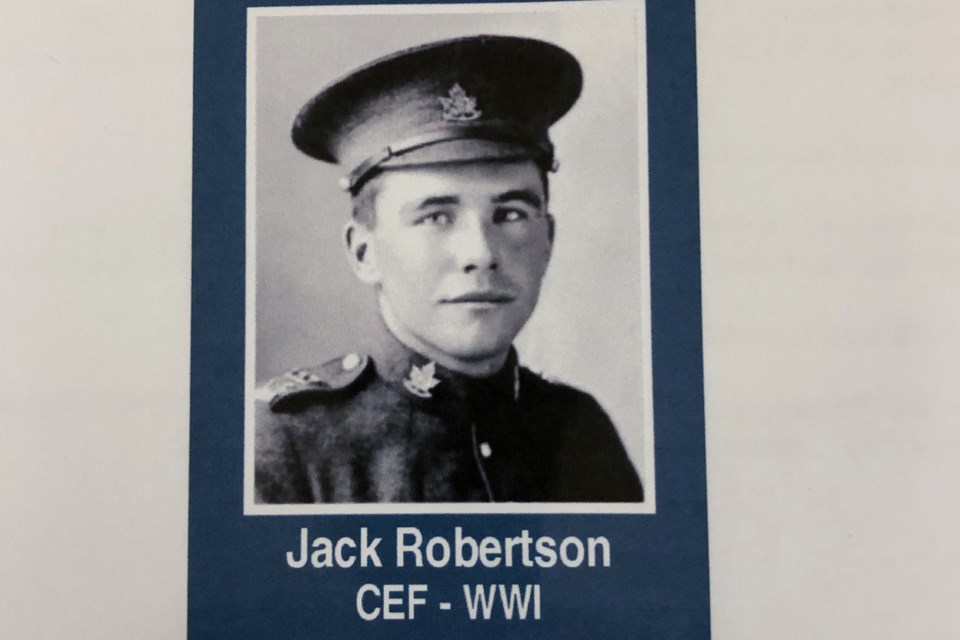DIDSBURY - The Didsbury Veterans Banner Project 2023 version has recognized and honoured three local men who served their county on the battlefield, one in the First World War and two in the Second World War.
Started in 2019, the banner project involves the displaying of large, street lamp-mounted banners around town that feature veteran portraits along with some of their respective service history.
The project is co-sponsored by the Didsbury Museum, the Royal Canadian Legion, and the Town of Didsbury.
Each year, the families and descendants of the veterans purchase the banners, which are displayed on the light standards from early October through to Remembrance Day.
Each banner is topped with Canadian and British flags as well as the words ‘Lest We Forget’.
Biographies of the veterans have been submitted by their families and compiled by Didsbury’s Grant Hemming. The histories are kept on display year-round at the Didsbury Museum.
This year’s veterans are A. Gordon Ford, Alfred F. Baudistel and Jack Robinson.
Alfred F. Baudistel
Baudistel was born in July 1917 and grew up on the family farm at Westcott. As a young man he enlisted in the Canadian Armed Forces and served during the Second World War.
“Alfred’s experience as an accomplished horseman proved to be very valuable while serving overseas. He led his army partners as well as many people to safety through the hills and territories in Europe. He also guided mules carrying food and supplies that were needed so badly.”
Towards the end of the war, Baudistel was instrumental in Operation Cowboy which helped save the endangered Lipizzan Horses in the village of Host, Czechoslovakia.
“This European breed of riding horse had been developed in the Habsburg Empire in the sixteenth century and is normally trained in classic dressage.”
After the war, he returned home to Westcott where he farmed on the family farm. In 1947 he married Ethel Bogner, also from Westcott; they had a daughter and a son.
A longtime member of the Didsbury Light Horse Association, Baudistel passed away in 1989.
A. Gordon Ford
Ford was born in Neustadt, Grey County, Ontario in 1907, and came to Alberta as a young man.
At the outbreak of the Second World War, he enlisted in London, Ontario. He served in the First Canadian Army Signals Corps, Royal Canadian Signals, as a lineman.
He was part of the 1st Corps, Canadian First Army that liberated Arnhem in April 1945 and Amsterdam in May 1945.
Ford attained the rank of sergeant and was discharged on Oct. 17, 1945.
After the war, he began farming in the Westcott area, marrying Jean Robertson, from Westcott, in October 1946.
“At different times they had milk cows, range cows, a feedlot and in later years established a Simmental herd of cattle and always had a few horses.”
The couple retired to Didsbury in 1986. A longtime member of the Didsbury and District Light Horse Association and the Westcott United Church, Ford died in 1988.
John Howard (Jack) Robertson
Born in Glenallen, Ontario in 1897, Robertson moved to farm in the Westcott area in 1899.
Robertson enlisted in the Canadian Expeditionary Force (CEF), 137th Battalion based in Calgary on March 1, 1916. On Aug. 21, 1916 he embarked at Halifax and arrived in England nine days later.
For his service in the war he received the Military Medal and was discharged in December 1919.
Returning to Westcott after the war, Robertson married Rose Adeline and the couple had four children.
“Jack was a farmer his whole life. After serving in the war, small things like the creek flooding his corrals didn’t faze him. In fact he thought it was fun moving the pigs by boats to higher ground.”
Robertson died on April 1, 1961 and is buried in the Westcott Cemetery.



